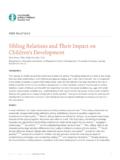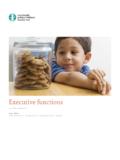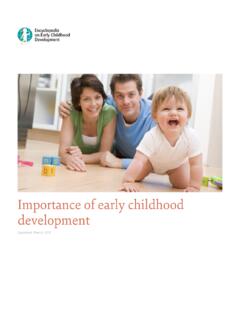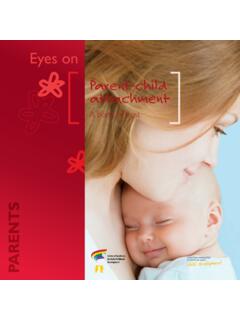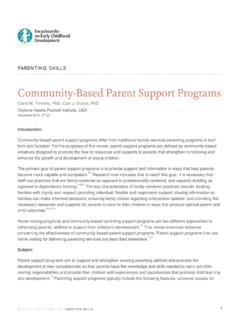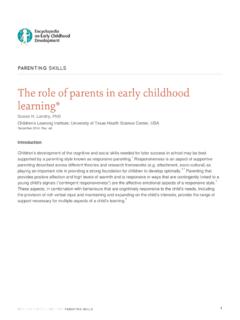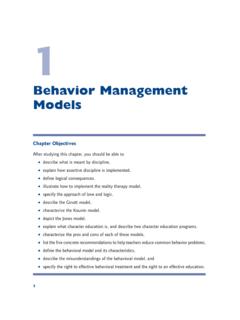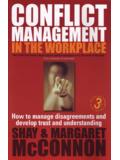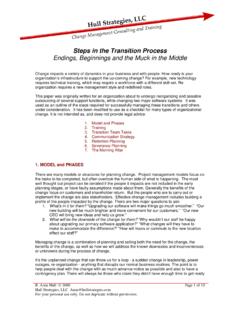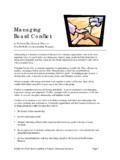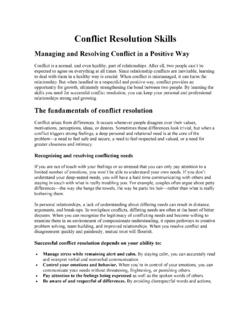Transcription of How Parents Can Help Children Cope With …
1 DIVORCE AND SEPARATIONHow Parents Can Help Children Cope With Separation/DivorceJoAnne Pedro-Carroll, PhDClinical Psychologist and Child Specialist, Founder, Children of Divorce Intervention Program, USAJune 2011 IntroductionEach year, millions of Children around the globe face family disruption, and in many countries, divorce rates are Children experience divorce deeply and personally, and the potential for negative short- and long-term consequences is considerably higher for Children whose Parents divorce than for those from non-divorced families. While parental divorce poses significant risks for Children that warrant concern, research shows that these outcomes are not the same for all Children , nor are they inevitable.
2 There are many factors that can reduce risks and promote Children s three biggest factors that impact Children s well-being during and after their Parents separation or divorce are potentially within Parents control: the degree and duration of hostile conflict, the quality of parenting provided over time, and the quality of the parent-child relationship. Underlying these, of course, are Parents own well-being and ability to function effectively. By learning how to manage their conflict, parent effectively, and nurture warm and loving relationships with their Children , Parents can have a powerful, positive effect on their Children , even as they undergo multiple difficult changes in their own importance of Parents roles and skills in helping their Children to cope with divorce cannot be overemphasized because it is primarily Parents who can mitigate or reverse potentially serious negative outcomes for their impact of divorce on Children is well documented.
3 Most react to their Parents divorce with painful emotions including sadness, confusion, fear of abandonment, guilt, misconceptions, anger, loyalty conflicts, worry and grief. Many Children experience feelings of loss when one parent moves out of the family residence, when a 2011-2018 CEECD / SKC-ECD | DIVORCE AND SEPARATION1111111111beloved pet is left behind, or even when they are with one parent and miss the In situations of intense conflict and domestic violence, Children may have a sense of relief. Their reactions may vary depending on their ages, but nearly all Children share a universal worry: What s going to happen to me?
4 In addition to revealing these difficult emotions, research also has shown that negative short-term consequences for Children after divorce include decreased academic achievement, poor psychological adjustment, social and emotional adjustment, and negative self Their physical health is compromised, too, especially in situations of high Meta analyses show a heightened risk of long-term consequences for a significant minority of Children into adulthood, including a poorer sense of well-being, lower socioeconomic status, poorer physical health, weaker emotional ties to their own Parents particularly their fathers and a higher risk of divorce in their own through divorce presents particular challenges because it is often difficult for Parents to know what their Children really think or feel about the changes in their family.
5 For a variety of reasons, most Children talk very little about their Parents divorce and their own complex feelings surrounding challenge for most Parents is to focus on achieving parenting goals when the multiple changes in their lives that precede and follow divorce cause enormous stress indeed, divorce is second only to death of a spouse as a major source of In addition, for many Parents , grieving the end of their marriage and managing their own painful, raw emotions make it doubly difficult to focus on their Children s expanded some Parents , continuing their hostility is a problem with enormous potential to damage their Children .
6 Unfortunately, this is sometimes fueled by a legal process that may feed their view of themselves as adversaries and focus on blame and retribution rather than on Children s best interests. Ongoing conflict also erodes effective parenting, which in turn contributes to Children s emotional and behavioural these difficulties, many Parents find ways to make their Children s needs a top priority and learn to parent effectively so that their Children can focus on the priorities of childhood learning and growing rather than on being their Parents caretakers or Context 2011-2018 CEECD / SKC-ECD | DIVORCE AND SEPARATION2222222222 There are several valuable areas of research that contribute heavily to our understanding of how Parents can help their Children cope with separation and divorce.
7 At the very heart of the issue is research on the risk and protective factors that put Children in jeopardy of negative short- and long-term consequences or provide supportive buffers that help them thrive. Other fruitful studies focus on which strategies are most effective in managing conflict and which parenting skills contribute to Children s growth and development. Studies of preventive intervention programs have yielded abundant data, not only the effectiveness of the program models, but also in increased understanding of how Children experience their Parents separation, divorce, conflict and parenting processes.
8 The fields of child development and brain research also contribute to developing approaches to parenting through divorce that are developmentally appropriate and foster Children s Research QuestionsAmong the many areas of research that contribute to understanding how to parent effectively through divorce, these are some of the most critical questions:Recent Research ResultsMuch can be done to prevent long-term problems and foster resilience in Children . Research provides a foundation that enables us to refine our understanding of exactly what Parents can do and what guidance professionals can offer ) Risk and protective factors.
9 While individual and extra-familial factors are also important, these are the family factors that have been identified through Risk Factors Family Protective are the factors that put Children at risk for negative short- and long-term outcomes, and what are those that help to protect them? constitutes effective parenting that helps Children to thrive in the wake of divorce or separation? with effective parenting, how can Parents foster a warm, strong parent-child relationship? can Parents learn to understand their Children s hidden feelings and concerns? can Parents best protect their Children from damaging conflict?
10 Do evidence-based interventions for Children and Parents bring to our understanding of how Parents can help Children cope with divorce? 2011-2018 CEECD / SKC-ECD | DIVORCE AND SEPARATION3333333333 Ongoing conflict between Parents , especially when it is abusive and/or focused on Children Diminished capacity to parent or poor parentingLack of monitoring Children s activitiesMultiple family transitions (divorce, remarriage, another divorce)Parent mental health problemsChaotic, unstable householdImpaired parent-child relationships Economic declineProtection from conflict between parentsCooperative parenting (except in situations of domestic violence or abuse)

